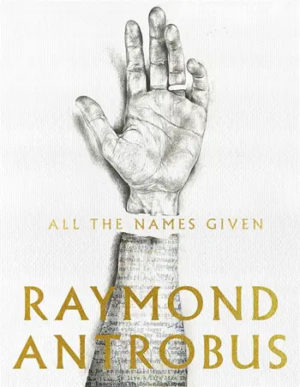You have no items in your cart. Want to get some nice things?
Go shopping
The poems in Raymond Antrobus’ All The Names Given are unapologetically located in the author’s life history. In a recent interview by Gboyega Odubanjo in Bathmagg, Antrobus is asked about his defence of the confessional. He is quick to deconstruct the (false) dichotomy of focus on selfhood, opening the form up as a means of anchoring the reader and also being political – in the sense that some lives exist in restricted social arenas (e.g., the domestic). Does this mean voicing of such experience is less valuable or produces lesser art?
In this critically acclaimed second collection, Antrobus continues to examine intersections of modern identity through gender, migration and D/deaf lenses. Duality is played with through scrutinising the history and emotional-social implications of a name: “The barman’s eyes in The Antrobus Arms/become sharp gates when I claim to be English”(“Antrobus or Land of Angels”). Perhaps the focus on names also nods to cultural reclamation by self-reference in the third person, often heard in rap braggadocio lyrics and extending back to Blues and Dancehall, possibly as a legacy of Black empowerment movements. As used by Antrobus, it has more of this flavour rather than that of navel-gazing.
At the heart of All The Names Given is a narrative around acceptance of family complexity through personal knowledge and growth. If The Perseverance is a male eulogy to a complex and often absent father, All The Names Given seems to be a song to a present and aging mother. There is gratitude and apology in some of the strongest poems in the collection, for example: “Mum, I knew you heard/the day I called you a bitch…What? you said,/holding the leash on yourself,/giving me the chance/to make another world” in “It Was Cold Under My Breath.” There is also often great tenderness: “mother/dyes her hair/don’t say greying/say sea salt/and cream” (“On Being a Son”). There are poems about markets, cafés, and adolescent infatuation, and of school friends from estates and outside chicken shops. These are celebrations of a multicultural urban community where vitality and inequality sit beside each other. The awkwardness of leaving people behind in a temporal journey toward craft and acclaim is palpable, sometimes making for a slight departure from the overall sympathetic immersion. We find the poet maturing through the journey of the book and finding love in adulthood, which again reframes how he views the past and his identities.
The collection is striking in its subtle use of ecology and landscape. There are intimations of how different cultures relate to the natural world and geographies: “The Antrobuses/owned Stone Henge/she says/as sure as if her own hand/rested on the stone”(“DEATH OF SIR E ANTROBUS (4TH baronet) OWNER AND GUARDIAN OF STONEHENGE,” about his maternal grandmother). Compare this position with “The dress turns the river/gold and there’s my father surfacing./He holds a white and green drum” in the opening poem “The Acceptance.” A reverie where hotel bathroom melds with “a river/a shimmering sheet of green marble,” reviving his father who is received by a Yoruban deity signing welcome. The motif of the river is later returned to in the context of Antrobus’ marriage, and there is exquisite language use in relation to the Mississippi, where “a riverboat glosses the shore/Tabitha and I are newlyweds”(“Ruler of My Heart by Irma Thomas is the first song on our wedding playlist”). The focus links the work into a poetics that talks of colonialism’s impact on the planetary eco-balance (e.g., The Human Planet – How We Created The Anthropocene, Simon Lewis and Mark Maslin, 2018) and sits alongside a body of contemporary work like Jason Allen-Paisant’s Thinking With Trees (Carcanet 2021), which explores the privilege of “leisure,” asking how enjoyment of green or natural space has a political legacy and is racialised.
Following on from The Perseverance (Penned in the Margins),in which there are explorations of mis-hearings, the investigation of language and the colonisation of D/deaf languages and space by spoken English/audio is engaged with in fresh ways – ellipses are left empty in the centre of a white page and the whole body of work is punctuated with [Caption Poems] partially inspired by Deaf sound artist Christine Sum Kim who questions, “What does sound mean to us?” Here the ableist laziness of captioning is exposed whilst simultaneously new lexicons of sensory engagement are opened up “[sound of self divided] [running] [breath on paper]” (“Every Black Man”). Antrobus asks questions about the poetics of sound as opposed to that of audio. He is an artist who is interested in (and holds insight into) the bounds of language and semantics, the disconnect between the oral and written, venturing into philosophy of language, and he does so with “so much music and invention and passion” (Ilya Kaminsky).
Antrobus plays with form throughout the book and has been deliberate in how the work can be experienced in audio, written, and signed versions. He cites his recent move to the USA as freeing for his writing in the interview with Bathmagg, perhaps moving away from the stylistic constraints of the English canon and possibly the legacy of his given name. The collection was shortlisted for the T.S. Eliot prize and will no doubt continue to garner well-deserved praise. Antrobus has a gift for lyric that overlies a reflective and participatory intellect. I look forward to future radical works.
All The Names Given
by Raymond Antrobus
Pan Macmillan, 96 pages

About Rushika Wick
Rushika Wick is a poet and doctor based in South London. Her first collection "Afterlife As Trash" was published by Verve in 2021 and highly commended in the Forward prizes. She is an assistant editor for tentacular magazine, a poetry reader for Ambit and editor for sunseekers poetry project. You can follow her on instagram @rushikawick




